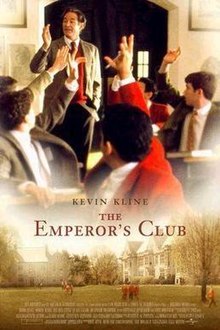The Emperor's Club
| The Emperor's Club | |
|---|---|

Theatrical release poster
|
|
| Directed by | Michael Hoffman |
| Produced by |
Marc Abraham Andrew S. Karsch Michael O'Neill |
| Screenplay by | Neil Tolkin |
| Based on |
The Palace Thief by Ethan Canin |
| Starring | Kevin Kline |
| Music by | James Newton Howard |
| Cinematography | Lajos Koltai |
| Edited by | Harvey Rosenstick |
|
Production
company |
|
| Distributed by | Universal Pictures |
|
Release date
|
|
|
Running time
|
109 minutes |
| Country | United States |
| Language | English |
| Budget | $12.5 million |
| Box office | $16,318,449 |
The Emperor's Club is a 2002 American drama film directed by Michael Hoffman and starring Kevin Kline. Based on Ethan Canin's short story "The Palace Thief," the film follows a prep school teacher and his students at a fictional boys' prep school, St. Benedict's Academy, near Washington, D.C.
It was filmed at Emma Willard School in Troy, New York, although St. Benedict's Academy is said to be modeled after Phillips Exeter Academy, a preparatory school in Exeter, New Hampshire. Kline, discussing the film at his alma mater, St. Louis Priory School, said that he modeled his character after the Rev. Dom Timothy Horner, an English Benedictine monk and headmaster of Priory when Kline was enrolled there.
In 2001, William Hundert, a retired Classics teacher, is flown out to a luxurious resort in the Hamptons owned by one of his former students in order to be the guest of honor in an impromptu reunion. As he gets settled in he reflects on the turn of events in a flashback of his time working at Saint Benedict's Academy, a prestigious preparatory school. Twenty-eight years earlier, a younger Mr. Hundert is enthusiastic about the start of the school year. His class turns out to be a strict yet inspiring lesson for the freshmen. They include laid-back Louis Masoudi, introverted Martin Blythe, and studious Deepak Mehta. Hundert inspires his students to study hard in order to become one of the three contestants for The Emperor's Club and be crowned "Mr. Julius Caesar", an academic competition between top three students of his class regarding the Classics. When the headmaster explains the contest to the students, he mentions that Blythe's father was once a "Mr. Julius Caesar".
...
Wikipedia
